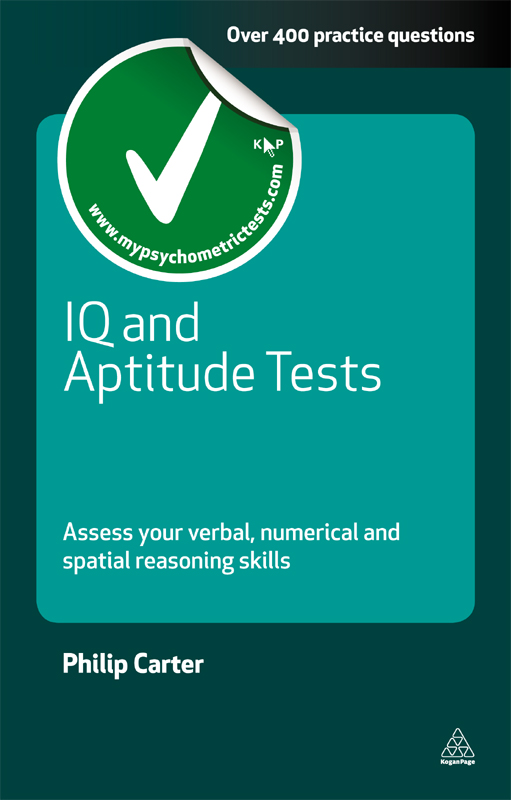

Publishers note Every possible effort has been made to ensure that the information contained in this book is accurate at the time of going to press, and the publishers and authors cannot accept responsibility for any errors or omissions, however caused. No responsibility for loss or damage occasioned to any person acting, or refraining from action, as a result of the material in this publication can be accepted by the editor, the publisher or any of the authors. First published in Great Britain and the United States in 2007 by Kogan Page Limited This edition 2011 Apart from any fair dealing for the purposes of research or private study, or criticism or review, as permitted under the Copyright, Designs and Patents Act 1988, this publication may only be reproduced, stored or transmitted, in any form or by any means, with the prior permission in writing of the publishers, or in the case of reprographic reproduction in accordance with the terms and licences issued by the CLA. Enquiries concerning reproduction outside these terms should be sent to the publishers at the undermentioned addresses:
| 120 Pentonville Road | 525 South 4th Street, #241 | 4737/23 Ansari Road |
| London N1 9JN | Philadelphia PA 19147 | Daryaganj |
| United Kingdom | USA | New Delhi 110002 |
| www.koganpage.com | India |
Philip Carter 2007, 2011 The right of Philip Carter to be identified as the author of this work has been asserted by him in accordance with the Copyright, Designs and Patents Act 1988. ISBN 978 0 7494 6195 9 E-ISBN 978 0 7494 6199 7
British Library Cataloguing-in-Publication Data A CIP record for this book is available from the British Library.
Library of Congress Cataloging-in-Publication Data Carter, Philip J.
IQ and aptitude tests : assess your verbal, numerical and spatial reasoning skills / Philip Carter. p. cm. ISBN 978-0-7494-6195-9 ISBN 978-0-7494-6199-7 (e-bk) 1. Intelligence tests. 2.
AbilityTesting. 3. Self-evaluation. I. Title. II.
Title: Intelligence quotient and aptitude tests. BF431.3.C3617 2011 153.93dc22 2010031004
Typeset and eBook by Graphicraft Limited, Hong Kong Printed and bound in India by Replika Press Pvt Ltd Contents
A n aptitude test is, generally, any test designed to measure potential for achievement. The word aptitude is sometimes misused to mean ability or achievement; however, there is a subtle difference between the three words aptitude , ability and achievement , which can be distinguished as follows:
- aptitude how quickly or easily you will be able to learn in the future;
- ability what you are able to demonstrate in the present;
- achievement what you have accomplished in the past.
There are nine different types of aptitude, which may be summarized as follows:
In the case of most aptitude tests there is usually a set time limit, which must be strictly adhered to in order for the test to be valid, and there is usually an average score that has been standardized in comparison with the scores of a group of people who have taken the same test. The tests that follow in are divided into three main sections: verbal aptitude, spatial aptitude and numerical aptitude. consists of four separate IQ tests, each consisting of a mixture of verbal questions, numerical questions and questions involving diagrammatic representation.
Note: Because they have been newly compiled for this book, the tests have not been standardized in comparison to scores obtained by other groups. Nevertheless there is a guide to assessing your performance at the end of each test and, because several of the tests relate to specific aptitudes, the results will give you the opportunity to identify your own particular strengths and weaknesses.

T he definition of verbal aptitude is the capacity for general lexical skills the understanding of words and the ability to use them effectively. People who possess a high level of verbal skills often excel in fields such as writing (author, journalist, editor, critic), teaching (language, drama), the legal profession (judge, barrister, lawyer) and personnel work (advocate, human resources, counsellor) and as actors, psychologists, interpreters and interviewers. Mastery of words is seen by many as having in ones possession the ability to produce order out of chaos. Because of this it is argued that command of vocabulary is an essential measure of intelligence, with the result that verbal tests are widely used in IQ testing.
Verbal reasoning tests are designed to measure basic verbal aptitude. Typically such tests include spelling, grammar, word meanings, completing sentences, synonyms (words that are the same or similar in meaning to each other) and antonyms (words that are opposite in meaning to each other). The exercises that follow test basic verbal aptitude in a number of disciplines, including synonyms, antonyms, analogy, odd one out and verbal comprehension. For each test a performance assessment is provided. The time limit that is specified for completing each test should not be exceeded; otherwise your score will be invalidated. This test is a miscellaneous selection of 30 questions designed to measure language use or comprehension, and your ability to adapt to different types of question.
You have 60 minutes in which to answer the 30 questions. You should read the instructions to each question carefully before attempting it. Which word in brackets is most similar in meaning to the word in capitals? ERSTWHILE (fallacious, deviant, previous, honest, candid)
Which word in brackets is most similar in meaning to the word in capitals? PEDESTRIAN (plinth, ordinary, slow, erudite, rueful)

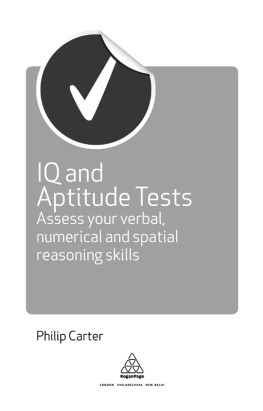
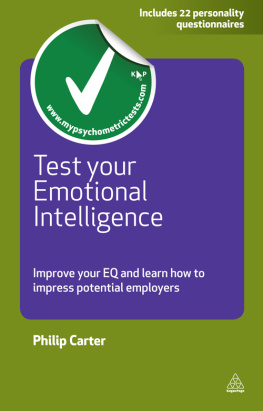

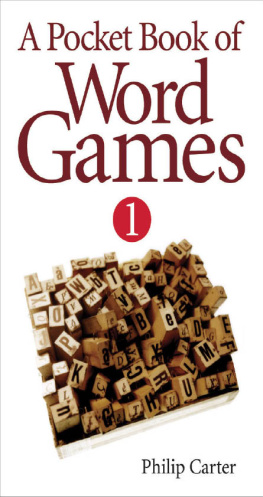


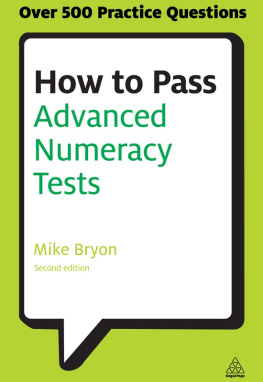
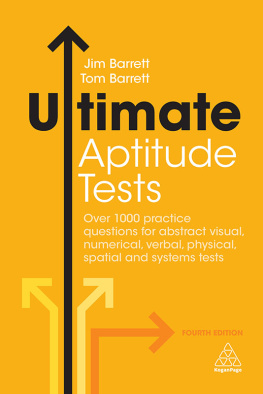
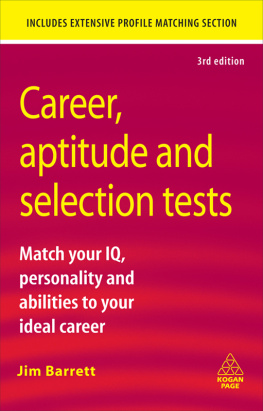

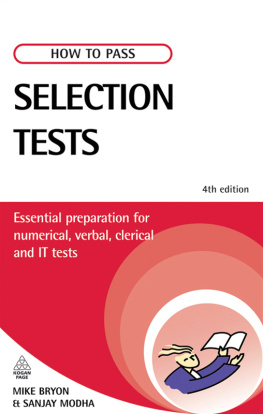
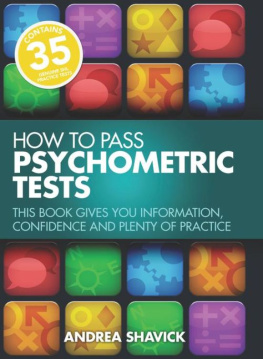
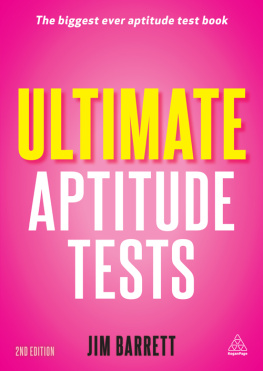
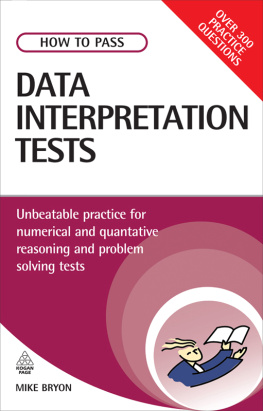
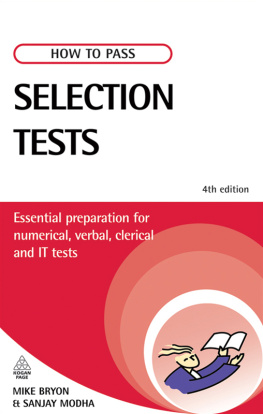

 Publishers note Every possible effort has been made to ensure that the information contained in this book is accurate at the time of going to press, and the publishers and authors cannot accept responsibility for any errors or omissions, however caused. No responsibility for loss or damage occasioned to any person acting, or refraining from action, as a result of the material in this publication can be accepted by the editor, the publisher or any of the authors. First published in Great Britain and the United States in 2007 by Kogan Page Limited This edition 2011 Apart from any fair dealing for the purposes of research or private study, or criticism or review, as permitted under the Copyright, Designs and Patents Act 1988, this publication may only be reproduced, stored or transmitted, in any form or by any means, with the prior permission in writing of the publishers, or in the case of reprographic reproduction in accordance with the terms and licences issued by the CLA. Enquiries concerning reproduction outside these terms should be sent to the publishers at the undermentioned addresses:
Publishers note Every possible effort has been made to ensure that the information contained in this book is accurate at the time of going to press, and the publishers and authors cannot accept responsibility for any errors or omissions, however caused. No responsibility for loss or damage occasioned to any person acting, or refraining from action, as a result of the material in this publication can be accepted by the editor, the publisher or any of the authors. First published in Great Britain and the United States in 2007 by Kogan Page Limited This edition 2011 Apart from any fair dealing for the purposes of research or private study, or criticism or review, as permitted under the Copyright, Designs and Patents Act 1988, this publication may only be reproduced, stored or transmitted, in any form or by any means, with the prior permission in writing of the publishers, or in the case of reprographic reproduction in accordance with the terms and licences issued by the CLA. Enquiries concerning reproduction outside these terms should be sent to the publishers at the undermentioned addresses: 